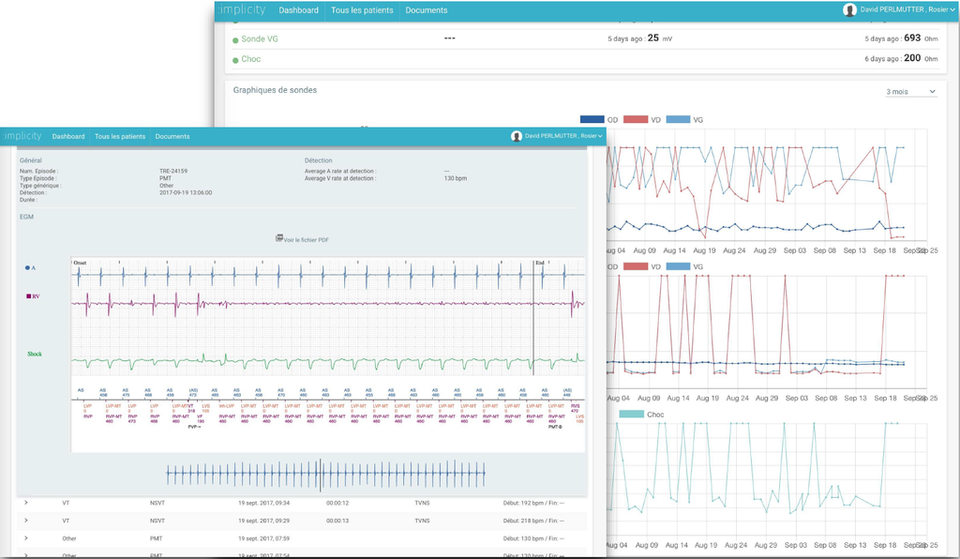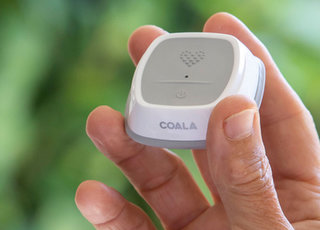Implicity
Rethinking Telecardiology
By Gergana Koleva
Implicity enables smart telemonitoring of connected cardiac devices by processing heart implant data along with information from the patient´s medical history, leading to more contextualized analysis and vastly reduced false positive alerts.
Founded in 2016, Implicity is revamping the cardiac telemonitoring field with a cloud-based platform that collects data registered by cardiac implantable electronic devices (implantable pacemakers, defibrillators and implantable loop recorders) on one single universal platform. The software is universally compatible with the devices of all leading global manufacturers: Abbott, Biotronik, Boston Scientific, Microport, and Medtronic. Dr. Arnaud Rosier - electrophysiologist, founder and CEO of the French start-up, says that the technology he helped create ushers in a long overdue era in remote monitoring.
“The idea behind Implicity came in 2007 with the conviction that remote monitoring of cardiac devices will become mandatory, that human resources will not be sufficient to offer such level of care to all patients, and that medical-grade software algorithms will become necessary,” says Dr. Rosier, reflecting on the venture´s early years before it was formally incorporated. “Today, those predictions have come true and it has become clear that a single interoperable platform with data from all major manufacturers is of great value to cardiology teams. The benefits on routine care and research for our customers suggest that digitalization and organization around one universal tool have a significant value and is necessary to envision AI as the next step towards care efficiency.”
The company is working on a proprietary AI algorithm that takes the patient´s medical context (patient-reported medical history, clinical data, medication, and implantation indication) into account in order to filter the relevant alerts for the medical team.
Alert management tool
Implicity dedicated platform includes patient clinical information and brings a lot of value to the process of triaging critical patients. This special feature is what sets it apart from proprietary manufacturer platforms, not designed to incorporate clinical information beyond their device´s own data stream.
The underlying AI-based technology will enable a high-accuracy alert management and correctly identify false positives for adverse events that generate unwarranted alerts. Situations such as these arise when a telemonitoring system detects atrial arrhythmia and issues an alert, which is unnecessary because the patient is already on oral anti-coagulation treatment – an example of external information that current monitoring systems do not incorporate.
“The information from devices is very useful, but in 85% of cases it is irrelevant as no action is required. That’s because context is everything when it comes to managing these notifications,” says Dr. Rosier.
In addition to the high accuracy of Implicity´s alert management tool, its underlying AI algorithm has the potential to make a secondary use of patients´ clinical data to proactively evaluate their risk of ischemic stroke. Also, the software can recommend medication adjustments based on patients’ actual risk level, effectively providing a channel for preventive care.
“Digitalization of clinical practice and new knowledge are vital to understanding what patient subgroups need (which treatment) and making sense of data trends in the field of heart failure prevention, for instance. Heart failure prediction is still based on either basic weight scale or symptoms monitoring, which efficacy remains questionable. We, at Implicity, have access to data from all manufacturers’ devices. Our ability to correlate it to patient outcomes is a potential source of patient care improvement,” says Dr Rosier.
“We bring two kinds of innovative algorithms to help healthcare professionals: efficiency algorithms that help triage the large amount of data from devices and prediction algorithms which uses the full potential of AI to assess patient’s individual risk and predict events such as deterioration or onset of arrhythmia.”

“We bring two kinds of innovative algorithm to help healthcare professionals: efficiency algorithms that help triage the large amount of data from devices and prediction algorithms where we expect to bring new evidence for managing patients, such as being able to predict deterioration or onset of arrythmia.”
Key features
Business model
Cognizant of the increasing importance enterprise customers place on data privacy, Implicity prides itself for its full regulatory compliance with GDPR, the European Union´s flagship data privacy regulation. Its cloud infrastructure uses secure access and encrypted data guaranteeing integrity and security.
“As a physician, I wanted Implicity to be not only a digital company but a medical device one. We always strive to share the highest privacy and security standards that partnering manufacturers have, “ says Dr Rosier
In addition, Implicity´s platform has another significant safety feature embedded in its design: materiovigilance, or recall management. This means that whenever a cardiac prosthetic device gets recalled, the software may be used to send an update to the medical team to inform them of the event. Since Implicity platform does not require software installation, the cloud-based solution is centrally updated such that clients always have the latest version.
Other notable features include an internal messaging application for seamless communication between physicians, nurses, and other members of integrated care teams, the curation of all patient data on a single dashboard and finally, action traceability.
“Having myself as a physician struggled with daily IT and data processing issues, I was able to pin point the problem and provide the needed product specifications for Implicity. The platform is designed to respond to a need I understand deeply,” says Dr. Rosier.
Implicity business model is based on hospital subscriptions, since most of the value is generated for the benefit of medical teams – although patients, payers, and device-makers also benefit indirectly (in France and in the USA, for example, remote monitoring is reimbursed). As the company´s platform is compatible with all electronic cardiac implants from global manufacturers, it pursues partnerships with all of them. Meanwhile, if differentially formatted data is made available by any of them, it tries to incorporate it into the platform without disrupting the overarching design and structure.
“We are a cloud-based solution and are able to deploy in most countries with large volumes of patients,” says Dr. Rosier, celebrating the manufacturer-neutral design and interoperability of the platform.
Implicity covers 30,000 patients in over 60 medical facilities across Europe and the United States. Its HIPAA-compliant platform is available in the U.S., to monitor remotely over 10,000 patients in more than 10 healthcare facilities.
“Cardiac monitoring, especially in the U.S., is still a very human resources-dependant activity. Major actors such as independent diagnostic and testing facilities hire numerous technicians to make sense of signals from Holter recordings of patients. This is a domain where companies such as Implicity can bring value by cutting down on false positives while relying on automated diagnosis features that are more scalable than humans.”

“A single interoperable platform with data from all major manufacturers is of great value to heart teams. The benefits for routine care and research for our customers suggest that digitalization and organization around one universal tool have a significant value and is necessary to envision AI as the next step to patient efficiency”
– Arnaud Rosier, co-founder and CEO, Implicity





